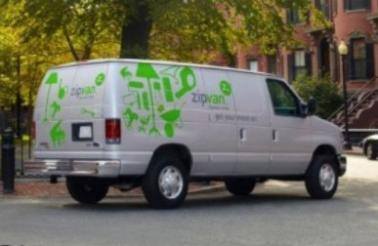
By Katie Fehrenbacher
Over the past decade, car sharing company Zipcar has started to disrupt the way people view car ownership, by offering cars in urban areas as a service. Now Zipcar could start disrupting the moving business, too. Zipcar says it plans to offer full-size cargo vans — dubbed Zipvan — in a pilot project in Sa n Francisco in response to customers showing an interest in renting large Zipcars by the hour for moving stuff around cities. Zipcar will also target small businesses looking for a cheaper way to move goods.
Zipcar actually has seen some success with these specialized vans already, as the U.K. car sharing company Streetcar, which Zipcar acquired, already offers this service. For now, Zipcar is only launching the pilot in San Francisco, and will offer 15 Ford E-150 cargo vans around the Bay Area at a cost of $14.75 per hour and $99 per day. Zipcar says the Ford E-150 vans will be able to fit a queen-sized mattress and will be ideal for picking up furniture, transporting musical equipment and moving apartments.
Zipar’s move into specialized vehicles for moving stuff shows the potential of using its network to expand the sharing of goods and services. Zipcar has 650,000 members that pay per hour to rent its 9,500 vehicles across the U.S., and there’s a good chance Zipcar can get those 650,000 members to pay for other renting services, like vans. Zipcar turned its first quarter profit in a decade recently.
Car sharing is the flagship business out of the trend of collaborative consumption, or using the web and mobile to share goods and services. Other services include peer-to-peer car sharing like Getaround (neighbors renting out their cars to other neighbors), office space sharing like Loosecubes, and even sharing of smaller goods like baby clothes via ThredUp. This trend relies on ubiquitous connectivity, customer comfort with sharing goods via the web, and a growing population looking to share limited resources.
Courtesy http://gigaom.com

